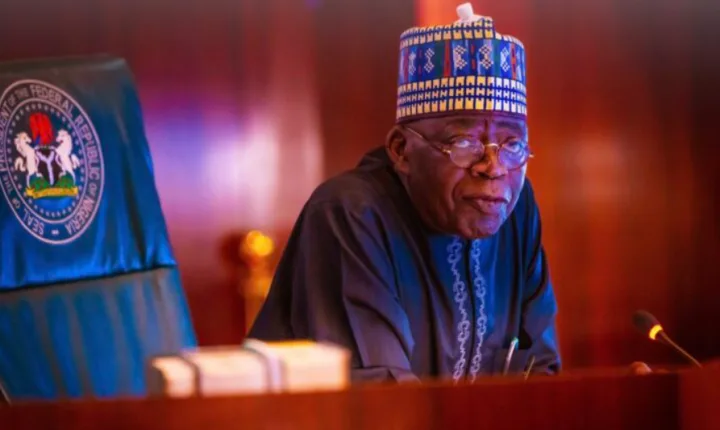President Bola Ahmed Tinubu has urged the Central Bank of Nigeria (CBN) to take a lead role in funding the newly created endowment scheme for the National Arts Theatre, Iganmu, Lagos, as part of efforts to secure long-term financing for the preservation and promotion of Nigeria’s cultural heritage. The president made the call during the unveiling of the renovated National Theatre, where he stressed the importance of sustainable investment in arts and culture as a driver of national unity, creativity, and economic growth.
Tinubu, who officially inaugurated the refurbished facility, noted that the endowment would serve as a critical financial backbone for the Theatre’s operations, enabling it to remain self-sustaining while nurturing local talent and hosting global artistic events. He emphasized that the scheme should not only depend on government allocations but also attract robust support from financial institutions, corporate organizations, and philanthropists. The CBN, he said, must play a catalytic role by ensuring that the endowment has strong financial underpinnings to guarantee its success.

According to the president, Nigeria’s arts and culture industry has the potential to rival other sectors in terms of revenue generation if properly structured. He pointed to the growing global recognition of Nigerian music, film, and fashion as evidence of the country’s creative power. By giving the National Theatre a financial base through the endowment, Tinubu argued, the government was not just preserving a cultural landmark but also investing in a sector that could generate jobs, attract tourism, and strengthen Nigeria’s soft power globally.
The refurbished National Theatre, which underwent an extensive facelift under the auspices of the Central Bank-led Bankers’ Committee initiative, now boasts state-of-the-art facilities, upgraded performance halls, exhibition spaces, and modern infrastructure designed to host both local and international events. The president commended the Bankers’ Committee for their commitment to the project, saying their intervention had transformed a once-neglected facility into a symbol of national pride.
Tinubu further underscored that cultural preservation must go hand in hand with economic viability. “We must build a culture of sustainability in our national institutions. The National Theatre is not only for entertainment; it is a hub for economic opportunities in the creative sector. For this reason, the Central Bank and the financial community must ensure the endowment is well-capitalized and professionally managed,” he said.
The president’s call has already generated discussions among stakeholders in both the financial and creative industries. Some cultural practitioners welcomed the move, noting that long-term funding could help address the perennial challenge of inadequate resources for the arts. They argued that a properly managed endowment could ensure consistent support for local artists, promote cultural exports, and keep the National Theatre running at global standards.
Financial analysts, however, cautioned that while the CBN’s involvement could provide stability, transparency and governance must be prioritized. They pointed out that endowment funds in other parts of the world thrive because they are shielded from mismanagement and political interference. According to them, Nigeria must learn from best practices to ensure that the National Theatre endowment becomes a sustainable model rather than a short-lived initiative.
The Minister of Arts, Culture and Creative Economy, Hannatu Musa Musawa, who also spoke at the event, described the endowment as a “historic step” toward building Nigeria’s creative economy into a formidable sector. She pledged that her ministry would work closely with the CBN and private partners to ensure the fund was properly structured, with clear guidelines for disbursement, accountability, and impact assessment.
For artists and performers, the reopening of the National Theatre marks a new chapter. Many expressed optimism that the improved facilities and planned endowment would attract more events and provide opportunities for young creatives to showcase their work on a grand stage. They also urged the government to extend similar initiatives to other cultural institutions across the country.
Observers note that Tinubu’s emphasis on the creative industry aligns with his administration’s broader push for economic diversification. With oil revenues proving increasingly unstable, the government is looking to alternative sectors—such as agriculture, digital technology, and the creative industries—to generate growth and employment. By urging the CBN to support the National Theatre endowment, the president signaled that arts and culture are now firmly on the national economic agenda.
Beyond economics, the National Theatre also carries symbolic weight. Originally built in the 1970s and first opened for FESTAC ’77, the facility has long been regarded as a cultural landmark. Its decline over the years had been a source of disappointment for many Nigerians, but its revival is being seen as a gesture of national renewal. Tinubu tapped into this sentiment during his speech, noting that the Theatre “tells the story of our nation, our struggles, and our triumphs” and must never again be allowed to fall into neglect.
As the Theatre begins its new journey, the focus will be on how the endowment is implemented and sustained. Stakeholders say success will depend on attracting broad-based contributions from both the public and private sectors, ensuring prudent management, and building confidence among creatives and investors alike.
For now, Tinubu’s appeal to the Central Bank has set the tone for what could become a transformative funding model for Nigeria’s cultural institutions. If executed effectively, the National Theatre endowment could serve as a blueprint for other sectors, combining public commitment with private investment to safeguard national assets while driving economic opportunities.
Support InfoStride News' Credible Journalism: Only credible journalism can guarantee a fair, accountable and transparent society, including democracy and government. It involves a lot of efforts and money. We need your support. Click here to Donate
